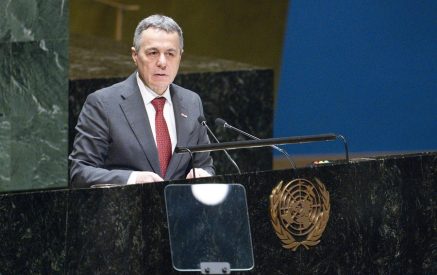How to prevent and combat the evolving threat of all forms of terrorism was discussed today at the joint meeting of the OSCE Forum for Security Co-operation (FSC) and OSCE Permanent Council.
“OSCE participating States committed themselves to not supporting terrorist acts in any way and to take appropriate measures to prevent and combat terrorism in all its forms,” said Armen Papikyan, Armenian FSC Chairperson during his opening remarks. “In light of the evolving nature of terrorism, there is a need to assess our actions and adjust our responses, particularly today, as countries remain focused on the fight against the COVID-19 pandemic.”
The joint session, organized under the Armenian FSC Chairmanship and Sweden’s 2021 OSCE Chairpersonship, provided a platform for discussing recent trends and challenges related to terrorism, such as the growing use of new technology and the phenomenon of foreign terrorist fighters, and their impact on the OSCE region. It also examined how national, regional and international mechanisms can effectively prevent and combat terrorism. The role of the OSCE and participating States’ commitments in these efforts was also explored.
“We need to find effective strategies and must continue our ambition to prevent and combat terrorism in a unified way,” said Ulrika Funered, Chairperson of the OSCE Permanent Council, during her opening remarks. “This encompasses political, socioeconomic and environmental security, democracy and the rule of law and must be done in full compliance with human rights and principles of international law.”
Read also
A key part of global efforts is recognizing the potential role of new technologies for combating terrorism but also how it helps further terrorists’ operations, said Vladimir Voronkov, Under-Secretary-General of the United Nations Office of Counter-Terrorism. “To understand and address both the positive and negative impacts of new technologies, we need to establish partnerships that leverage unique entry points, capabilities, and insights from member states, regional organizations, civil society, and the private sector. It is also imperative to strengthen regional and international co-operation in this regard.”
Hrant Aghasaryan, from the National Security Service of Armenia, explained how international terrorist organizations are now spreading their efforts both online and offline, as well as expanding their activities and combat experience to other conflict zones using a range of technologies and methods, including engaging recruits, such as foreign terrorist fighters. To combat this, he called for the global community to combine its efforts and engage in “closer dialogue and co-operation to neutralize terrorist threats”.
Magnus Norell, Adjunct Scholar at the Washington Institute for Near East Policy and Senior Fellow at the European Foundation for Democracy, said: “With the large number of initiatives taken over especially the last 20 years, emphasis ought to be on implementation, such as words leading to concrete action.”
“It is and will remain impossible to prevent all attacks,” said Éric Denécé, Director of the French Centre for Intelligence Studies. “But that does not mean that we are helpless in the face of this threat.” Using France as a primary example, Denécé explained how countries for decades have faced and combated terrorist threats and radicalization that leads to violence. “The fight against terrorism is a permanent and global fight, which requires realism and constancy, determination and measure.”






















































